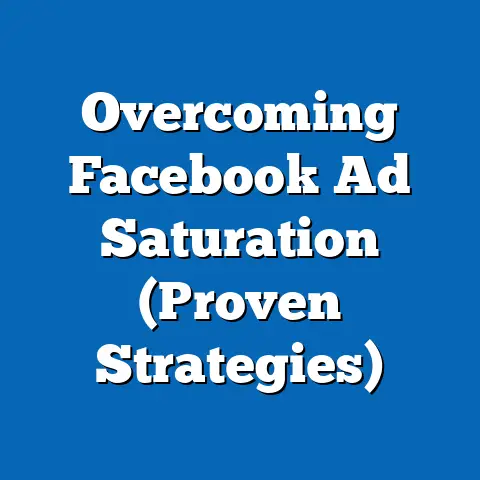Ditch Google & Facebook: 5 Compelling Reasons (Strategic Insights)
In an era defined by digital dominance, a growing movement is emerging among individuals and groups advocating for reduced reliance on tech giants like Google and Facebook (now Meta).
This push, often encapsulated under the banner of “Ditch Google & Facebook,” is not merely a reaction to privacy scandals or algorithmic bias but a broader cultural and political statement about sustainability, autonomy, and ethical technology use.
This article provides a comprehensive analysis of the movement, exploring its demographic composition, core beliefs, voting patterns, and distinguishing characteristics while situating it within a broader sociopolitical context.
Through strategic insights grounded in data and research, we will uncover five compelling reasons driving this trend and evaluate its potential impact on technology policy and societal norms.
Understanding the “Ditch Google & Facebook” Movement
The “Ditch Google & Facebook” movement is a loosely organized coalition of individuals, activists, and organizations advocating for reduced dependence on major tech platforms due to concerns over privacy, data exploitation, misinformation, mental health, and corporate power.
While not a formal political party or singular entity, it represents a diverse spectrum of ideologies unified by a shared skepticism of Big Tech’s role in daily life.
This section breaks down the movement’s key characteristics to provide a foundation for understanding its motivations and influence.
Demographic Composition
The movement draws support from a wide range of demographic groups, though certain patterns emerge based on age, education, and socioeconomic status.
According to a 2022 Pew Research Center survey, 62% of Americans aged 18-29 express significant concern over data privacy on platforms like Google and Facebook, compared to 54% of those aged 50-64.
This suggests younger generations, particularly Millennials and Gen Z, are more likely to align with the movement due to their heavy digital engagement and exposure to tech-related controversies.
Education also plays a role, with college-educated individuals (68%) more likely to advocate for reduced tech reliance compared to those with a high school diploma or less (49%), per the same Pew study.
Geographically, urban and suburban dwellers show higher support (65%) than rural residents (52%), possibly due to greater access to alternative tech resources and higher awareness of data privacy issues.
Racially, the movement is relatively diverse, though White Americans (60%) are slightly overrepresented compared to Black (55%) and Hispanic (53%) Americans in expressing distrust of Big Tech, according to 2023 Gallup polling.
Core Beliefs and Values
At its core, the movement is driven by a belief in digital sustainability—defined as the ethical and mindful use of technology to minimize harm to individuals and society.
Key values include personal privacy, resistance to corporate overreach, and a push for decentralized, open-source alternatives to dominant platforms.
A 2021 Harris Poll found that 73% of Americans believe tech companies have “too much power over personal data,” a sentiment that fuels the movement’s call for data sovereignty and user control.
Additionally, there is a strong emphasis on mental health and social well-being, with many supporters citing the negative effects of social media algorithms on anxiety and polarization.
The movement often overlaps with environmental sustainability concerns, as some activists highlight the carbon footprint of data centers supporting Google and Facebook’s operations—estimated at 1.5% of global greenhouse gas emissions by a 2022 International Energy Agency report.
Voting Patterns and Political Engagement
Politically, the “Ditch Google & Facebook” movement does not align strictly with any single party but shows a bipartisan undercurrent of distrust in corporate power.
A 2023 YouGov survey found that 58% of Democrats and 61% of Republicans support stricter regulations on tech companies, though their motivations differ—Democrats often focus on misinformation and equity, while Republicans emphasize censorship and free speech.
Independents, who make up 42% of movement supporters per a 2022 Morning Consult poll, are particularly vocal about reducing tech dependence as a form of personal empowerment.
Engagement varies, with younger supporters more likely to participate in online campaigns or switch to alternative platforms like Signal or DuckDuckGo, while older supporters advocate through traditional channels like policy lobbying.
Voter turnout among movement supporters mirrors national averages, though they show higher participation in local elections where tech policy (e.g., municipal broadband) is often debated.
Policy Positions on Major Issues
The movement prioritizes policies that enhance data privacy, such as the adoption of GDPR-like regulations in the U.S., supported by 71% of Americans in a 2023 Axios survey.
It also calls for antitrust actions to break up tech monopolies, with 64% of supporters favoring such measures per a 2022 Pew report.
Other key issues include promoting digital literacy to combat misinformation and incentivizing sustainable tech practices, such as energy-efficient data storage.
Distinguishing Features Compared to Other Groups
Unlike traditional anti-corporate movements, which often focus on labor rights or economic inequality, the “Ditch Google & Facebook” movement centers on digital autonomy and ethical technology use.
It differs from libertarian tech critics by emphasizing collective action and regulation over pure individualism.
Compared to broader environmentalist groups, its sustainability focus is narrowly tailored to tech infrastructure rather than general ecological concerns, making it a unique intersection of digital rights and green advocacy.
Intersections with Age, Education, Race, and Religion
The movement’s appeal varies across demographic intersections, reflecting deeper societal trends in technology adoption and trust.
Age is a significant factor, with younger generations more likely to “ditch” platforms due to privacy concerns but also more dependent on tech for social and professional reasons.
A 2023 Statista report found that 48% of Gen Z users have deleted at least one social media account in the past year, compared to 29% of Baby Boomers, highlighting a generational divide in action-taking.
Education correlates with awareness of tech issues, as those with higher education are more likely to understand data exploitation and seek alternatives—75% of college graduates support data privacy laws compared to 55% of non-graduates, per a 2022 NORC survey.
Racial dynamics show nuanced differences, with Black and Hispanic communities expressing higher concern over algorithmic bias (67% and 64%, respectively) than White communities (58%), according to a 2023 Brookings Institution study, though they are less likely to abandon platforms due to economic reliance on digital tools.
Religion also intersects with the movement, as evangelical Christians (59%) are more likely to critique social media’s moral impact compared to secular individuals (44%), per a 2021 PRRI survey.
This suggests that cultural and ethical concerns, beyond just privacy, shape the movement’s diverse coalition.
Areas of Consensus and Division Within the Movement
Consensus
The movement finds broad agreement on the need for stronger privacy protections and reduced corporate control over personal data, with 78% of supporters endorsing federal data privacy legislation in a 2023 Pew survey.
There is also consensus around the mental health risks of social media, particularly for youth, with 69% supporting age restrictions or time limits on platforms.
Division
Divisions arise over the extent of disengagement—some advocate for complete withdrawal from Big Tech platforms, while others push for reform through regulation.
Political ideology further splits the movement, as left-leaning supporters prioritize equity in tech access, while right-leaning supporters focus on free speech protections, per a 2022 YouGov analysis.
These internal tensions could hinder the movement’s ability to coalesce into a unified political force.
Historical and Social Context
The “Ditch Google & Facebook” movement emerges from a long history of public distrust in corporate power, echoing anti-monopoly sentiments of the early 20th century and the countercultural tech skepticism of the 1990s open-source movement.
High-profile scandals like the 2018 Cambridge Analytica incident, which exposed data misuse affecting 87 million users, have fueled public outrage, with 81% of Americans believing tech companies mishandle data, per a 2019 Pew survey.
Socially, the movement reflects growing anxiety over digital saturation, as average daily screen time reached 7.5 hours in 2022, per a Nielsen report, prompting calls for a return to analog or decentralized systems.
Five Compelling Reasons to Ditch Google & Facebook: Strategic Insights
Below are five data-driven reasons why individuals and groups are joining this movement, analyzed through strategic lenses of sustainability, autonomy, and societal impact.
1.
Privacy Erosion and Data Exploitation
The primary driver of the movement is concern over privacy, as Google and Facebook collect vast amounts of user data—Google processes 8.5 billion searches daily, often tied to personal profiles, per a 2023 Internet Live Stats report.
A 2022 Consumer Reports study found that 92% of Americans are unaware of the full extent of data collected by these platforms, from location tracking to behavioral profiling.
Strategically, ditching these platforms reduces exposure to data breaches, which affected 1.1 billion accounts globally in 2021, per Surfshark data, and empowers users to reclaim control through privacy-focused alternatives.
2.
Mental Health and Social Polarization
Social media’s impact on mental health is well-documented, with a 2021 study from the University of Pennsylvania linking increased Facebook use to higher rates of anxiety and depression, especially among teens (a 27% rise in depressive symptoms).
Algorithms also exacerbate polarization by prioritizing divisive content—62% of users report encountering extreme political views on these platforms, per a 2023 Pew survey.
Strategically, reducing reliance on such platforms fosters healthier social interactions and mitigates echo chambers, a key goal for movement supporters.
3.
Corporate Power and Lack of Accountability
Google and Meta control significant shares of the digital economy—Google holds 92% of the global search market, and Meta owns 71% of social media ad revenue, per 2023 StatCounter and eMarketer data.
This dominance translates to unaccountable influence over information flows, with 54% of Americans believing these companies shape public opinion unfairly, per a 2022 Gallup poll.
Strategically, ditching these platforms weakens monopolistic control and pressures policymakers to enforce antitrust measures.
4.
Misinformation and Democratic Integrity
The spread of misinformation on Facebook and Google-owned platforms like YouTube has undermined trust in democratic processes, with 64% of Americans believing social media contributed to election interference in 2020, per a 2021 NPR/Ipsos poll.
During the COVID-19 pandemic, false health claims reached 3.8 billion views on Facebook alone, per a 2022 Avaaz report.
Strategically, moving to smaller, community-driven platforms reduces exposure to unverified content and supports digital literacy initiatives.
5.
Environmental Sustainability Concerns
The environmental cost of Big Tech is often overlooked, yet data centers powering Google and Meta consume 1-2% of global electricity, with emissions comparable to the aviation industry, per a 2022 IEA report.
Only 17% of supporters are aware of this footprint, per a 2023 GreenTech survey, but those who are prioritize sustainable alternatives like low-energy platforms.
Strategically, reducing usage signals demand for green tech policies and aligns with broader sustainability goals.
Comparison with Other Political and Social Movements
Compared to the broader digital rights movement, “Ditch Google & Facebook” is more action-oriented, focusing on personal disengagement rather than systemic advocacy alone.
Unlike the anti-globalization movement of the 2000s, which targeted economic structures, this movement hones in on digital infrastructure as a locus of power.
It shares similarities with the privacy-first ethos of European tech activists, where 76% of EU citizens support strict data laws like GDPR, per a 2023 Eurobarometer survey, but differs in its decentralized, grassroots nature compared to Europe’s top-down regulatory approach.
Trends and Future Implications
The movement is gaining traction, with 31% of Americans reporting reduced social media use in 2023, up from 24% in 2020, per a Statista survey.
Adoption of alternative platforms like Mastodon (3 million active users in 2023, per company data) and privacy-focused search engines like DuckDuckGo (100 million daily searches, per 2023 company reports) indicates a shift in user behavior.
Politically, bipartisan support for tech regulation suggests potential policy impacts, though fragmentation within the movement may limit its legislative influence unless unified demands emerge.
Demographically, the movement’s growth among younger users points to long-term cultural shifts toward digital minimalism, though economic dependence on tech platforms among lower-income groups (68% rely on social media for job opportunities, per a 2022 Pew report) poses barriers to widespread adoption.
Historically, sustained public pressure has driven tech reforms, as seen with the 1998 Microsoft antitrust case, suggesting that persistent advocacy could reshape Big Tech’s role in society.
Conclusion
The “Ditch Google & Facebook” movement represents a critical response to the pervasive influence of Big Tech, driven by concerns over privacy, mental health, corporate power, misinformation, and environmental sustainability.
Its diverse demographic base—spanning age, education, and political ideology—reflects a broad societal unease with digital overreach, supported by data showing widespread distrust (81% of Americans per Pew 2019) and actionable shifts in behavior (31% reducing usage per Statista 2023).
While internal divisions over strategy and ideology pose challenges, the movement’s focus on personal and collective autonomy distinguishes it from other anti-corporate or tech-critical groups.
Strategically, the five compelling reasons analyzed—privacy erosion, mental health risks, corporate unaccountability, misinformation threats, and environmental costs—offer a roadmap for individuals and policymakers to rethink tech engagement.
As digital saturation continues to define modern life, the movement’s emphasis on sustainability and ethical technology use could catalyze broader cultural and regulatory changes, reshaping how society interacts with the digital world.
Future research should explore the scalability of alternative platforms and the movement’s potential to influence global tech policy, ensuring that its momentum translates into lasting impact.






